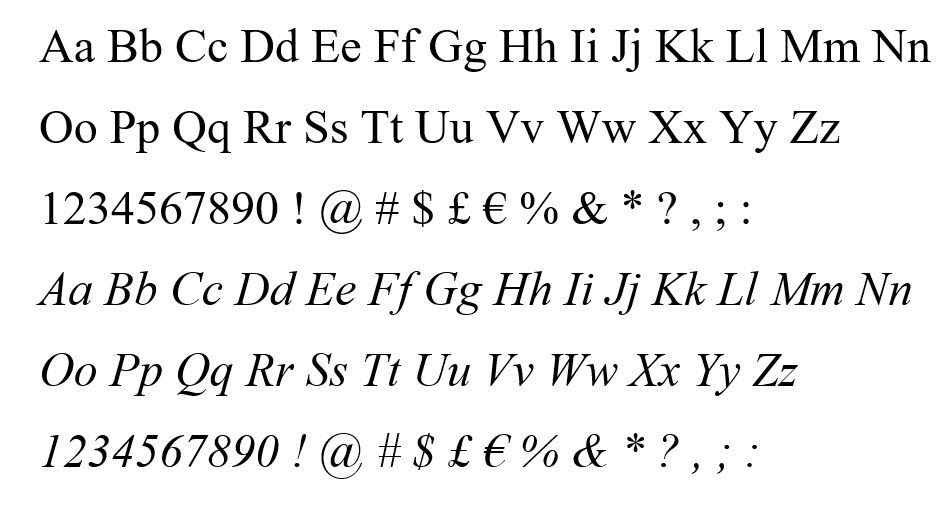Times New Roman font family
Overview
This remarkable typeface first appeared in 1932 in The Times of London newspaper, for which it was designed. It has subsequently become one of the worlds most successful type creations. The original drawings were made under Stanley Morison's direction by Victor Lardent at The Times. It then went through an extensive iterative process involving further work in Monotype's Type Drawing Office. Based on experiments Morison had conducted using Perpetua and Plantin, it has many old style characteristics but was adapted to give excellent legibility coupled with good economy. Widely used in books and magazines, for reports, office documents and also for display and advertising.
Times New Roman version history
Version 2.55 - This WGL4 version of Times New Roman was first supplied with the Final Windows 95 euro update that shipped on 4 November 1998. This version contains the euro.
Version 2.50 - This version of Times New Roman is supplied with European versions of Windows 98. North American users can add it by installing multilanguage support. This version contains the euro.
Version 2.45 - This Win ANSI version of Times New Roman is supplied with the US version of Windows 98.
Version 2.01 - This special version of Times New Roman was only supplied with the beta version of the Windows 95 euro update.
Version 2.00 (Win ANSI) - This Win ANSI version of Times New Roman is supplied with Windows 95.
Version 2.00 (WGL4) - This WGL4 version of Times New Roman is supplied with Windows 95 and Windows NT4. This version does not contain the euro.
Version 1.00 - This version was supplied with Windows 3.1 and Windows for Workgroups 3.11.
| Description | |
|---|---|
| File name | Times.ttf Timesbd.ttf Timesbi.ttf Timesi.ttf |
| Styles & Weights | Times New Roman Times New Roman Bold Times New Roman Bold Italic Times New Roman Italic |
| Designers | Monotype Type Drawing Office - Stanley Morison, Victor Lardent 1932 |
| Copyright | © 2017 The Monotype Corporation. All Rights Reserved. Hebrew OpenType Layout logic copyright © 2003 & 2007, Ralph Hancock & John Hudson. This layout logic for Biblical Hebrew is open source software under the MIT License; see embedded license description for details. |
| Font vendor | Agfa Monotype Corporation |
| Script Tags | dlng:'Armn', 'Cyrl', 'Grek', 'Latn' slng:'Arab', 'Armn', 'Cyrl', 'Grek', 'Hebr', 'Latn' |
| Code pages | 1252 Latin 1 1250 Latin 2: Eastern Europe 1251 Cyrillic 1253 Greek 1254 Turkish 1255 Hebrew 1256 Arabic 1257 Windows Baltic 1258 Vietnamese OEM OEM Character Set 869 IBM Greek 866 MS-DOS Russian 865 MS-DOS Nordic 864 Arabic 863 MS-DOS Canadian French 862 Hebrew 861 MS-DOS Icelandic 860 MS-DOS Portuguese 857 IBM Turkish 855 IBM Cyrillic; primarily Russian 852 Latin 2 775 MS-DOS Baltic 737 Greek; former 437 G 708 Arabic; ASMO 708 850 WE/Latin 1 437 US |
| Fixed pitch | False |
Licensing and redistribution info
- Font redistribution FAQ for Windows
- License Microsoft fonts for enterprises, web developers, for hardware & software redistribution or server installations
Products that supply this font
| Product name | Font version |
|---|---|
| Windows 11 | See the Windows 11 page. |
| Windows 10 | See the Windows 10 page. |
| Windows 8.1 | See the Windows 8.1 page. |
| Windows 8 | See the Windows 8 page. |
| Windows 7 | See the Windows 7 page. |
| Windows Vista | 5.01 |
| Windows XP SP2 | 3.00 |
| Windows XP | 2.95 |
| Windows 2000 | 2.76 |
| Windows 98 Second Edition | 2.76 |
| Windows 98 | 2.50 |
| Windows 95 | 2.00 |
| Windows 3.1 | 1.00 |
| Windows Server 2008 | 5.01 |
| Windows Server 2003 | 2.90 |
| Windows NT Terminal Server 4.0 | 2.00 |
| Windows NT Workstation 4.0 SP4 | 2.50 |
| Windows NT Workstation 4.0 | 2.00 |
| Windows NT Workstation 3.5 | 1.77 |
This typeface is also available within Office applications. For more information visit this page.
Style & weight examples
